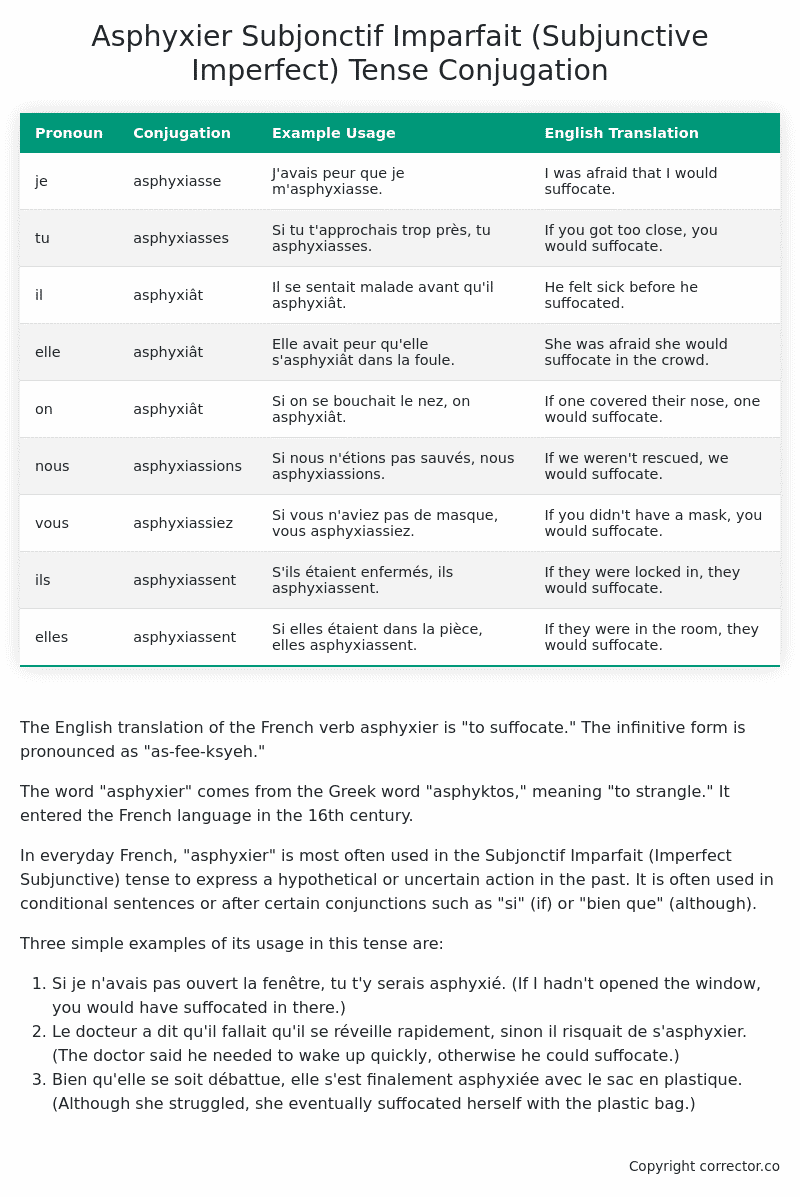Subjonctif Imparfait (Subjunctive Imperfect) Tense Conjugation of the French Verb asphyxier
Introduction to the verb asphyxier
The English translation of the French verb asphyxier is “to suffocate.” The infinitive form is pronounced as “as-fee-ksyeh.”
The word “asphyxier” comes from the Greek word “asphyktos,” meaning “to strangle.” It entered the French language in the 16th century.
In everyday French, “asphyxier” is most often used in the Subjonctif Imparfait (Imperfect Subjunctive) tense to express a hypothetical or uncertain action in the past. It is often used in conditional sentences or after certain conjunctions such as “si” (if) or “bien que” (although).
Three simple examples of its usage in this tense are:
- Si je n’avais pas ouvert la fenêtre, tu t’y serais asphyxié. (If I hadn’t opened the window, you would have suffocated in there.)
- Le docteur a dit qu’il fallait qu’il se réveille rapidement, sinon il risquait de s’asphyxier. (The doctor said he needed to wake up quickly, otherwise he could suffocate.)
- Bien qu’elle se soit débattue, elle s’est finalement asphyxiée avec le sac en plastique. (Although she struggled, she eventually suffocated herself with the plastic bag.)
Table of the Subjonctif Imparfait (Subjunctive Imperfect) Tense Conjugation of asphyxier
| Pronoun | Conjugation | Example Usage | English Translation |
|---|---|---|---|
| je | asphyxiasse | J’avais peur que je m’asphyxiasse. | I was afraid that I would suffocate. |
| tu | asphyxiasses | Si tu t’approchais trop près, tu asphyxiasses. | If you got too close, you would suffocate. |
| il | asphyxiât | Il se sentait malade avant qu’il asphyxiât. | He felt sick before he suffocated. |
| elle | asphyxiât | Elle avait peur qu’elle s’asphyxiât dans la foule. | She was afraid she would suffocate in the crowd. |
| on | asphyxiât | Si on se bouchait le nez, on asphyxiât. | If one covered their nose, one would suffocate. |
| nous | asphyxiassions | Si nous n’étions pas sauvés, nous asphyxiassions. | If we weren’t rescued, we would suffocate. |
| vous | asphyxiassiez | Si vous n’aviez pas de masque, vous asphyxiassiez. | If you didn’t have a mask, you would suffocate. |
| ils | asphyxiassent | S’ils étaient enfermés, ils asphyxiassent. | If they were locked in, they would suffocate. |
| elles | asphyxiassent | Si elles étaient dans la pièce, elles asphyxiassent. | If they were in the room, they would suffocate. |
Other Conjugations for Asphyxier.
Le Present (Present Tense) Conjugation of the French Verb asphyxier
Imparfait (Imperfect) Tense Conjugation of the French Verb asphyxier
Passé Simple (Simple Past) Tense Conjugation of the French Verb asphyxier
Passé Composé (Present Perfect) Tense Conjugation of the French Verb asphyxier
Futur Simple (Simple Future) Tense Conjugation of the French Verb asphyxier
Futur Proche (Near Future) Tense Conjugation of the French Verb asphyxier
Plus-que-parfait (Pluperfect) Tense Conjugation of the French Verb asphyxier
Passé Antérieur (Past Anterior) Tense Conjugation of the French Verb asphyxier
Futur Antérieur (Future Anterior) Tense Conjugation of the French Verb asphyxier
Subjonctif Présent (Subjunctive Present) Tense Conjugation of the French Verb asphyxier
Subjonctif Passé (Subjunctive Past) Tense Conjugation of the French Verb asphyxier
Subjonctif Imparfait (Subjunctive Imperfect) Tense Conjugation of the French Verb asphyxier (this article)
Subjonctif Plus-que-parfait (Subjunctive Pluperfect) Tense Conjugation of the French Verb asphyxier
Conditionnel Présent (Conditional Present) Tense Conjugation of the French Verb asphyxier
Conditionnel Passé (Conditional Past) Tense Conjugation of the French Verb asphyxier
L’impératif Présent (Imperative Present) Tense Conjugation of the French Verb asphyxier
L’infinitif Présent (Infinitive Present) Tense Conjugation of the French Verb asphyxier
Struggling with French verbs or the language in general? Why not use our free French Grammar Checker – no registration required!
Get a FREE Download Study Sheet of this Conjugation 🔥
Simply right click the image below, click “save image” and get your free reference for the asphyxier Subjonctif Imparfait tense conjugation!

Asphyxier – About the French Subjonctif Imparfait (Subjunctive Imperfect) Tense
Formation
Common Everyday Usage Patterns
Interactions with Other Tenses
Subjonctif Présent
Indicatif Passé Composé
Conditional
Conditional Perfect
Summary
I hope you enjoyed this article on the verb asphyxier. Still in a learning mood? Check out another TOTALLY random French verb conjugation!


